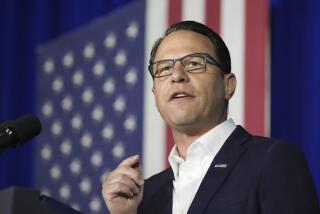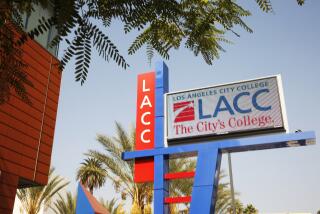‘Unfortunately, I haven’t been to Oxford yet.’
- Share via
The Woodland Hills youth who was California’s only representative in this year’s batch of Rhodes scholars fulfilled one of the inevitable duties attending that honor last week. He traveled over the hill to speak to a group of mostly elderly men and women about “Life at Oxford.”
It was in December that Jonathan Shapiro, a 21-year-old graduate of Harvard, won the prestigious two-year scholarship to Oxford University in England. A few days later he received a call from Alma Pedroza, a former Mexican opera singer who now runs a Los Angeles travel agency.
She asked him to speak to a group called California Town Meetings, which gathers monthly in the Fairfax district.
Shapiro accepted, glad to make a triumphal return to the childhood turf where, he said, he spent his early years eating kreplachs at Cantor’s before his parents moved to the San Fernando Valley 16 years ago.
On the appointed day, he arrived with his parents, Leonard and Deborah, at the Deluxe Palm Terrace Auditorium, an upstairs hall with hardwood floors and a small stage at the back.
Members of California Town Meetings sat around several large, round tables covered with white linen. Most of the men were casual in open collars and short sleeves. Many of the women wore summer dresses and hats.
The Shapiros sat at the head table beside Pedroza, who wore a red bonnet. Pedroza is the mother of Los Angeles newscasters Inez and Cecilia Pedroza. She is also a Dodger fan and a composer.
Before lunch, she announced that later there would be a “wonderful surprise. We’ll all get a copy of my song, ‘Fernando! You Are The One!’ and we’re all going to sing it.”
She also introduced her co-moderator, Monte Randall, a gray-haired man in an American Legion cap who sat alone beside the lectern on a metal chair. She described him as a scholar and philosopher. He wrote the words to “Fernando! You Are The One!” she said.
Then everyone got in line for a buffet lunch.
Shapiro, tall and striking in a cream tropical suit, gave his talk while they ate.
He began with a tribute to his parents.
“Over the years, they have gone to back-to-school nights, Little League practices, Little League games, teacher conferences, school orientations, plays, graduations, as if their lives and jobs depended on it,” he said. “And their willingness to go great distances to attend would fill a travel agent like Mrs. Pedroza with gladness.”
He listed their trips. They had flown to Sacramento to see him serve as a student representative on the state Board of Education, then to the Northeast to hear him address the national convention of the American Legion, then to Harvard to see him perform Gilbert and Sullivan.
“Already they’re making plans to visit me in England,” he said.
Then he got to the topic.
“The topic that Mrs. Pedroza has assigned me is an excellent one,” Shapiro said. “I was going to speak on my experience at Oxford University. Unfortunately, I haven’t been to Oxford yet.” The scholarship doesn’t begin until October.
Instead, he talked about the man whose largess will pay his way.
“Though he might have been many things, Cecil Rhodes, who gives the name to the scholarship I have received, was a great man,” Shapiro said.
“Yes, he was,” said Randall, the philosopher, still sitting beside the lectern.
Shapiro described Rhodes as a sickly youth and a mediocre scholar who became a forceful man. After gaining control of 90% of the world’s diamond production at the turn of the century, Rhodes sought to extend the British Empire, Shapiro said.
“To his supporters, he was a conquering hero, a victorious Caesar,” Shapiro said. “To his enemies and critics, he was a racist who painted Africa red with the blood of diamond-field slaves.”
Shapiro said Rhodes established the scholarships to give students from the Commonwealth countries, the United States and England the benefits of an Oxford education and an Anglo-Saxon culture that they might go on to “fight the world’s fight.”
Of course, the world’s fight as Rhodes saw it was to promote the superiority of the Anglo-Saxon culture, Shapiro said.
As a Jew, Shapiro was troubled by the story. But he accepted what he called the challenge to make the best of the good lessons in Rhodes’ legacy.
“If his ideals seemed contradictory, if he failed to live up to his own ambitions and principles, then the worst we might conclude is, great men are still human. We might learn also that great men and women are individuals of action . . .”
“Yes,” Randall intoned again.
” . . . willing to strive toward their goals despite costs or difficulties. I look forward to conducting the world’s fight when I come back, hopefully in the political arena.”
Shapiro sat down, and Randall got up to add a few thoughts.
“Let us hope that someday there will be something in the human breast, something in the human cognomen, something in the human connective tissue of apathy with the movement of the universe itself,” he said, “so that we can get away from the violence and the terrible impotence that comes from war. Meanwhile, we still have to fight for what we have.”
Then Pedroza led everyone in singing “Fernando! You Are The One!”
Shapiro, showing promise as a politician, sang along, as did his parents.
But they waved goodby and slipped away while the group headed for the South Seas with a travel film.
More to Read
Sign up for Essential California
The most important California stories and recommendations in your inbox every morning.
You may occasionally receive promotional content from the Los Angeles Times.














